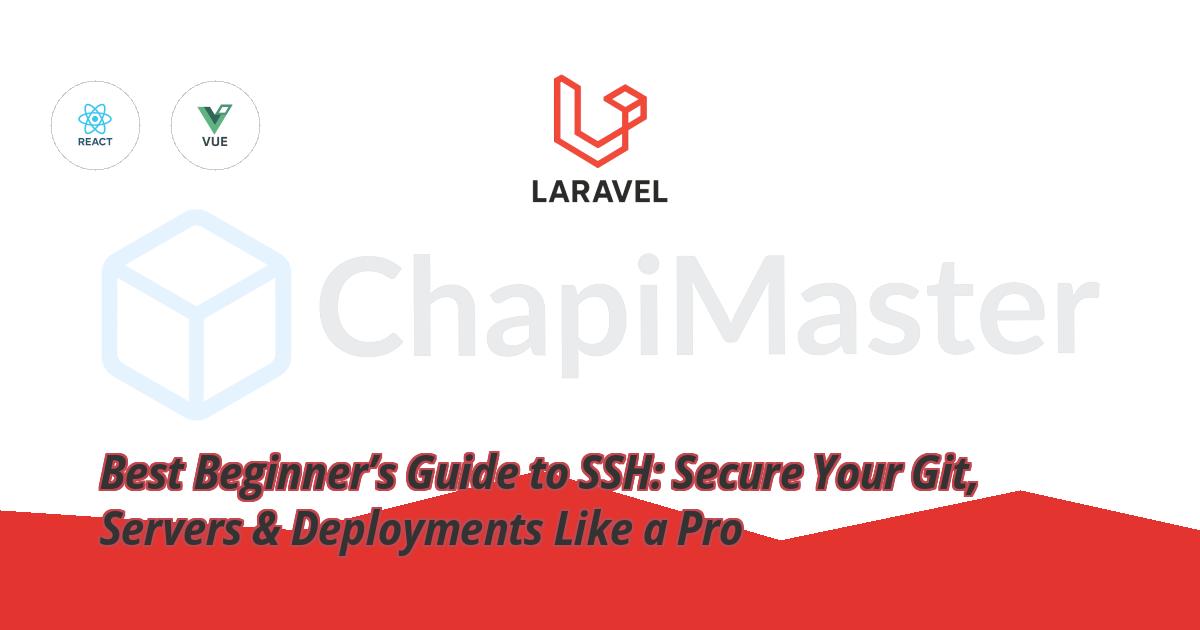SSH (Secure Shell) is one of the most essential tools every developer should know. Whether you're pushing code to GitHub, connecting to a VPS, or deploying applications — SSH keeps your communication secure and encrypted.
What is SSH?
SSH stands for Secure Shell. It’s a secure communication protocol that allows one computer to safely talk to another over a network. It’s mainly used for logging into remote servers, transferring files, and authenticating Git operations securely.
⚠️ SSH encrypts all your communication — meaning no one can steal your passwords or code while you’re online.
Why SSH Exists
Before SSH, developers used insecure protocols like telnet or ftp, which sent everything — including passwords — in plain text. Anyone monitoring your network could easily steal that data.
SSH solves this by:
- 🔒 Encrypting communication between client and server
- 🧩 Allowing key-based authentication (no need for manual passwords)
- 🧠 Enabling automation tools and CI/CD pipelines securely
SSH Keys = Your Digital ID Cards
SSH uses two keys to identify you:
- Private key: Your personal secret key — keep it safe on your local computer.
- Public key: Your “business card” that you add to GitHub, GitLab, or servers to recognize you.
What You Can Do with SSH
SSH isn’t only for GitHub — it’s much more powerful:
- 💻 Access remote servers securely —
ssh root@your-vps-ip
- 🔁 Authenticate Git operations — clone, push, pull without typing passwords
- 📦 Transfer files via
scp or sftp
- ⚙️ Automate deployments with scripts and CI/CD pipelines
Essential SSH Commands and Setup
Navigate to SSH Folder
List Existing SSH Keys
ls -al ~/.ssh
# or if already in .ssh folder
ls -al
Generate a New SSH Key
It’s recommended to generate keys in your user’s SSH folder (e.g., C:\Users\YourName\.ssh\ on Windows).
ssh-keygen -t ed25519 -C "your_email@example.com"
# if ed25519 is not supported
ssh-keygen -t rsa -b 4096 -C "your_email@example.com"
Add SSH Key to SSH Agent
The SSH agent is like your personal “key manager” — it holds your keys securely in memory while you’re working.
# Start the agent
eval "$(ssh-agent -s)"
# Add key to agent
ssh-add ~/.ssh/id_ed25519
# View loaded keys
ssh-add -l
# Remove all keys
ssh-add -D
Auto-start SSH Agent on Git Bash (Windows)
# Add this to ~/.bashrc or ~/.bash_profile
eval "$(ssh-agent -s)" >/dev/null
ssh-add -l >/dev/null 2>&1 || ssh-add ~/.ssh/id_ed25519
Copy Your Public Key
cat ~/.ssh/id_ed25519.pub
Copy the entire line that starts with ssh-ed25519 or ssh-rsa.
Manage Multiple SSH Keys with Config File
nano ~/.ssh/config
# Personal GitHub
Host github.com-personal
HostName github.com
User git
IdentityFile ~/.ssh/id_ed25519
# Work GitHub
Host github.com-work
HostName github.com
User git
IdentityFile ~/.ssh/id_rsa
Now you can clone using:
git clone git@github.com-personal:username/repo.git
git clone git@github.com-work:company/repo.git
Adding Your Key to GitHub, GitLab, and Bitbucket
GitHub
Go to Settings → SSH and GPG keys → New SSH Key.
Paste your public key and name it (e.g., “My Laptop Key”).
GitLab
Navigate to User → Preferences → SSH Keys and paste the key.
Bitbucket
Go to Personal Settings → SSH keys → Add new key.
Clone Repositories via SSH
git clone git@github.com:yourname/yourrepo.git
There are two main protocols for Git:
- HTTPS →
https://github.com/username/repo.git
- SSH →
git@github.com:username/repo.git
# Check current remote
git remote -v
# Switch HTTPS → SSH
git remote set-url origin git@github.com:username/repo.git
# Switch SSH → HTTPS
git remote set-url origin https://github.com/username/repo.git
Common SSH Commands
ssh user@host # Connect to remote server
scp file user@host:/path # Copy file securely
sftp user@host # Open secure FTP session
ssh-add -l # List loaded SSH keys
ssh-keygen -R hostname # Remove old key from known hosts
Conclusion
SSH is not just a tool — it’s your gateway to secure development and remote work. Whether it’s GitHub authentication, file transfer, or server deployment, mastering SSH will save you time and keep your projects safe.


